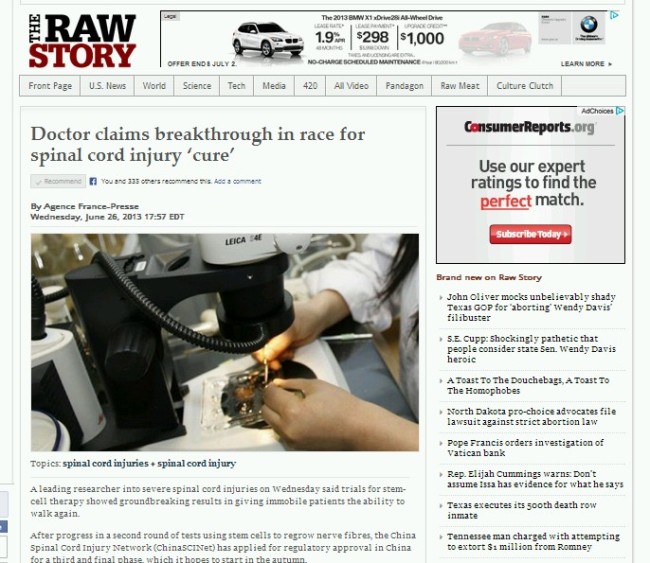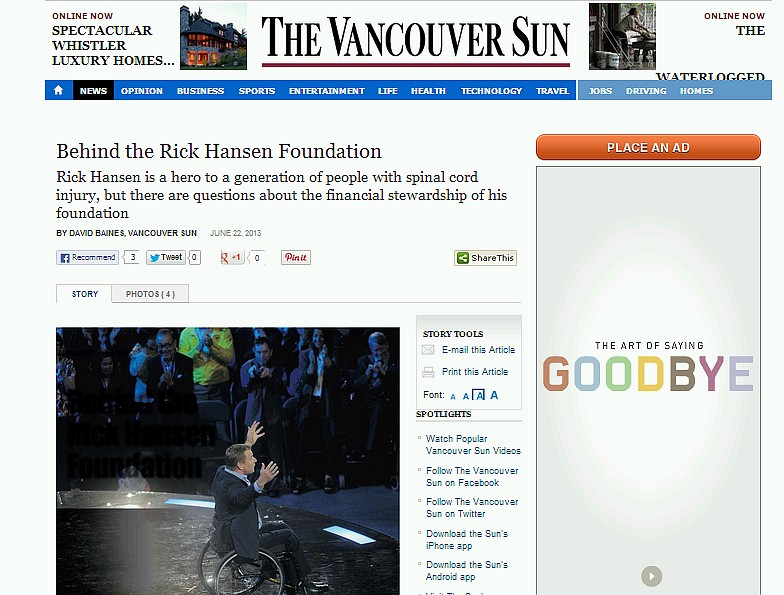Team from Hong-Kong with leadership of US based (Rutgers University) Dr. Wise Young announced very promising results after phase II Human trial with Umbilical Cord Blood Stem Cell’s therapy. This International project is progressing into Phase III trial that will include 240 participants in China, India, USA and Norway.
Press Release
ChinaSCINet Trials Yield Promising Results for Chronic Spinal Cord InjuryNo therapy has yet restored function to people with chronic complete spinal cord Injury. In Hong Kong and Kunming, China Spinal Cord Injury Network (ChinaSCINet) recently conducted the Phase II clinical trials that suggest umbilical cord blood mononuclear cell transplants and lithium can regenerate and improve recovery in people with chronic complete spinal cord injury. ChinaSCINet now proposes a definitive multicenter Phase III clinical trial to confirm these results in China.In Hong Kong, Professor Wai-sang Poon, Chair Professor and Chief of the Division of the Neurosurgery, Department of Surgery of the Chinese University of Hong Kong and Dr Gilberto Leung Ka-kit, Clinical Assistant Professor, Department of Surgery of The University of Hong Kong Li Ka Shing Faculty of Medicine, and their respective teams studied 8 people who averaged 13 years after severe spinal cord injury. In the two-year study, they showed that the umbilical cord blood mononuclear cell transplants are safe. In addition, using magnetic resonance diffusion tensor imaging, the team found that 2 of 5 subjects have fiber tract growth across the injury site at 6-18 months after treatment.In Kunming, Dr Hui Zhu and her colleagues have completed a clinical trial assessing effects of umbilical cord blood mononuclear cell transplants in 20 subjects who averaged 7 years after complete spinal cord injury. The subjects received intensive walking training for 3-6 months. At 6-12 months, 15 of the 20 subjects (75%) could walk in a rolling device with minimal assistance. Another 2 subjects could walk without any assistance using a four-point walker. These results are much better than expected.In addition, Dr Zhu and her colleagues have found that surgery alone to expose the spinal cord may improve walking function in people with chronic spinal cord injury. Over the past decade, they have surgically exposed and removed adhesions between the spinal cord and surrounding tissues of 50 patients with chronic complete spinal cord injury. Many of the patients improved after this “untethering” surgery and intensive walking training.The following caveats should be kept in mind. First, these are preliminary results from Phase II clinical trials that must be confirmed in Phase III randomized controlled trials. Second, it is not clear whether intensive locomotor training, “untethering” surgery, cell transplant, or a combination of the three therapies are responsible for the observed walking recovery. Third, while the subjects showed improved walking and descent of sensory levels, they did not show much improvement in their motor scores.ChinaSCINet proposes to carry out a multicenter Phase III clinical trial in China. This trial will test 120 subjects with chronic complete spinal cord injury, randomized to four groups with different therapies: untethering surgery only, surgery plus lithium, surgery plus2transplant, and surgery, transplant plus lithium. All subjects will undergo 3-6 months of intensive locomotor training and then assessed for 2 years.This trial (called CN103) will be the first surgically controlled clinical trial to assess a cell transplant therapy. It will provide definitive answers to three questions. First, does transplantation of umbilical cord blood mononuclear cells improve walking recovery compared to surgery alone? Second, does surgery and lithium improve walking recovery compared to surgery alone? Third, does lithium improve the effects of the cell transplants on walking recovery?The proposed trial will recruit subjects from 18 to 64 years old, with chronic (>1 year and neurologically stable for at least 6 months) complete (ASIA/ISCOS Impairment Scale A) spinal cord injury with neurological level at C4 to T10 inclusive. The subjects must be willing to participate in 3-6 months of locomotor training. Subjects should not have medical or orthopedic conditions that may prevent surgery or locomotor training. Participation is free of charge.ChinaSCINet will be applying for regulatory approval in China for the trial in Fall 2013. This summer, ChinaSCINet will establish cell processing laboratories in China that fulfill good manufacturing practice (GMP) regulations. Three major universities in Guangzhou, Xi’an, and Shanghai have signed memorandums of understanding with ChinaSCINet to set up such laboratories to provide cells for the clinical trial.The trial will cost about US$5 million. Stemcyte, Inc. is contributing about a third of the costs by donating the umbilical cord blood for the trial. ChinaSCINet is applying for grants from government in China to cover about a third of the costs, and the rest of the funding will be raised by the Hong Kong Spinal Cord Injury Fund (HKSCIF). The July 7 ATV fundraiser hosted by the HKSCIF is raising funds for the trial.This trial should have a very substantial impact. If umbilical cord blood mononuclear cell transplants improve walking recovery, China will be the first in world and in history to show a therapy that restore function in chronic complete spinal cord injury. The trial may show that intensive walking training and “untethering” surgery improve walking in people with chronic complete spinal cord injury. This would also be very worthwhile.Many people are waiting for therapies to restore function. Some have died while working for the cure, including Christopher Reeve and Bun Tsai. The trial provides hope to millions of people worldwide who have been told by their doctors that they should not expect to walk again after spinal cord injury. Restoring walking on earth is a greater achievement than walking on the moon.For enquiries, please contact Dr Wendy Cheng (Tel: 28660829) of ChinaSCINet.June 26, 2013


